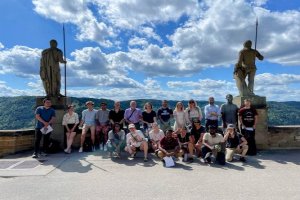At the Royster Global conference, doctoral students focus on mis- and disinformation

By Elizabeth Poindexter, The Graduate School
The sixth annual Royster Global Conference — the first held in person in two years — focused on the theme of mis- and disinformation, or how information spreads in a rapidly, increasingly global, communications landscape.
Seven Royster Society of Fellows doctoral graduate students from the University of North Carolina at Chapel Hill traveled to Germany for the 2022 Royster Global Conference, an initiative of The Graduate School designed to increase awareness and understanding of graduate education across international borders.
The sixth annual conference — the first held in person in two years — focused on the theme of mis- and disinformation, or how information spreads in a rapidly, increasingly global, communications landscape.
Tori Ekstrand ’03 (Ph.D.) an associate professor in the UNC Hussman School of Journalism and Media, provided structure and insight for the trip. She is the Dr. Caroline H. and Thomas S. Royster Distinguished Professor for Graduate Education at Carolina.
“Both mis- and disinformation have implications in academia,” Ekstrand said. Ekstrand explained that both mis- and disinformation can include discounting and backlash of expertise—putting it at odds with expertise found in academia.
“I’m hopeful that our time in Germany will help these young scholars understand that as they enter the academy—they also have tremendous opportunity and agency.”
Barbara Stephenson, vice provost for global affairs and chief global officer at Carolina, joined doctoral scholars for portions of the conference. She said that she was proud to observe the excellent international collaborations made possible by the conference.
“Carolina’s top graduate students wrestled with the implications of disinformation and disruption in a changing communications environment—issues vital to the well-being of our democracy and to individual citizens,” she said. “I witnessed our graduate students and faculty working with partners at Tübingen to address one of the great challenges of our time.”
A new research endeavor between the University and Universität Tübingen speaks to this commitment. A conference held earlier this year focused on core themes of data science and health, and data science and democracy. Stan Ahalt, the inaugural dean of the School of Data Science and Society, also attended portions of the Royster Global conference.
“As data and technology continue to evolve, we need frameworks to discuss how these issues will impact democratic societies,” Ekstrand said.
The conference included a conversation led by keynote speaker Christoph Bareither, a scholar in digital anthropology at the Universität Tübingen. Bareither focused on digital curation and how truth is defined when it comes to archiving social media and associated data.
The week-long experience also included workshops in analyzing social media content, what researchers must do differently when faced with threats to democracy, and the so-called big business of disinformation.
Royster Global participant Kierra Peak, an occupational science doctoral student at Carolina, attended her fourth Royster Global conference. As a graduate student, Peak played a role in shaping the conference’s overall structure.
“This year, we connected with international scholars who are engaged in a variety of different research topics,” Peak said. “That variety meant that participants asked genuine questions to provide insightful feedback about each area of research, including my own. The variety of topics—and fun excursions—kept the conference engaging.”
Hussman Associate Professor Deen Freelon, and Daniel Kreiss, Hussman’s Edgar Thomas Cato Distinguished Professor, also attended Royster Global and presented their own research and how it related to the conference topic. Freelon and Kreiss are both principal researchers with Carolina’s Center for Information, Technology, and Public Life (CITAP), which focuses on the intersection of politics and digital technology.
Royster Global included 17 student participants, with eight from Universität Tübingen and two from King’s College London. Royster Global launched in 2017 between UNC-Chapel Hill and King’s College London. Since then, it has expanded to include the participation of graduate students from three additional institutions: the National University of Singapore, Universidad San Francisco de Quito, and the Universität Tübingen.